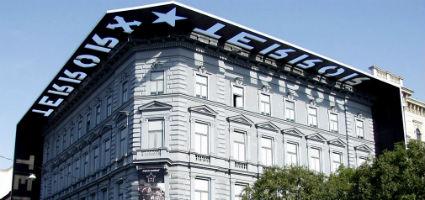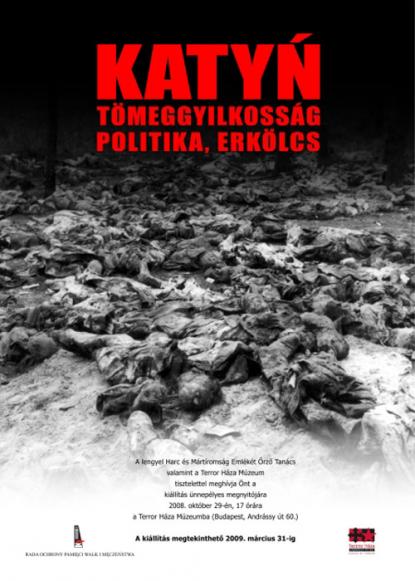2024. May 7. Tuesday
House of Terror Museum - Budapest
 |
Address: 1062, Budapest Andrássy út 60.
Phone number: (1) 374-2600
E-mail: muzeum@terrorhaza.hu
Opening hours: Tue-Sun 10.00-18.00
|
The exhibition has closed for visitors.
2008.10.29. - 2009.09.01.
Museum tickets, service costs:
|
Ticket
(valid for the temporary exhibitions, the permanent exhibition is not included )
|
1000 HUF
|
/ capita
|
|
Ticket for adults
|
2000 HUF
|
|
|
Group ticket for adults
(from over 20 people)
|
1500 HUF
|
/ capita
|
|
Ticket for students
(EU citizens from the age of 2 to 26 or with ISIC Card )
|
1000 HUF
|
|
|
Group ticket for students
(from over 20 people)
|
800 HUF
|
/ capita
|
|
Ticket for pensioners
(EU citizens from the age of 62 to 70)
|
1000 HUF
|
|
|
Group ticket for pensioners
(from over 20 people)
|
800 HUF
|
/ capita
|
|
Supplementary fee
(valid for the temporary exhibitions, extra ticket for the permanent exhibition )
|
500 HUF
|
/ capita
|
|
Group guide
(max. 30 people)
|
6000 HUF
|
|
|
Group guide
(2 groups, max. 60 people)
|
8000 HUF
|
|
|
Group guide
(max. 30 people)
|
8000 HUF
|
|
|
Group guide
(2 groups, max. 60 people)
|
15000 HUF
|
|
|
Audio guide
(in English, German)
|
1500 HUF
|
The Katyn massacre was an extremely awe-inspiring sin that appall people even in a world full of violence and barbarism. The massacre was an almost study case of unrevenged sin instigated by the cooperation of great powers and cynicism of world politics.

The massacre was ordered by political and party leaders. Civilians from countries that were not officially in war with the Soviet Union were taken prisoners and kept in camps then executed.
Secretly, without any indictment, the Soviets were able to round up much of the Polish intelligentsia. Of about 18.000 known victims 760 were doctors, 1040 teachers, and more than 100 were layers.
After the Germans in the spring of 1943 uncovered the Polish mass graves near the forest of Szmolenszk, the grave became means of game for the great powers. The Germans set up a wide-scale propaganda to disturb and get rid of the coalition opposing the Germans.
The Soviets declared the disclosing by the Germans a complete make believe of the German Fascist murderers. They accused the German Empire with the Katyn massacre and ceased relations with the legal Polish emigrant government operating in London after they Soviet called them the "Polish satellites of Hitler".
The USA and Great Britain did not want to acknowledge the massacre, neither did they want to publicise it. They accepted Stalin's declaration without hesitation as what was really important for them was to finish the war as soon as possible with the win of the allies. To that end, the Soviet Union's help was inevitable.
At the Yalta and Teheran conferences, secretly, without informing the Polish government, Stalin forced leaders of the West to acknowledge the new western borders. It meant that almost all regions seized in 1939-remained Soviet land and Poland was overseen by the Soviet.
Russia has not apologised for the event at Katyń up to now. On April 13, 1990, in a declaration the Soviet Union did not accept responsibility for the 1940 executions of imprisoned Polish officers in the Katyn forest but blamed a few leaders, namely Beria, Merkulov and those who helped them instead.
The perpetrators who ordered the massacre have still not been uncovered and convicted.

The massacre was ordered by political and party leaders. Civilians from countries that were not officially in war with the Soviet Union were taken prisoners and kept in camps then executed.
Secretly, without any indictment, the Soviets were able to round up much of the Polish intelligentsia. Of about 18.000 known victims 760 were doctors, 1040 teachers, and more than 100 were layers.
After the Germans in the spring of 1943 uncovered the Polish mass graves near the forest of Szmolenszk, the grave became means of game for the great powers. The Germans set up a wide-scale propaganda to disturb and get rid of the coalition opposing the Germans.
The Soviets declared the disclosing by the Germans a complete make believe of the German Fascist murderers. They accused the German Empire with the Katyn massacre and ceased relations with the legal Polish emigrant government operating in London after they Soviet called them the "Polish satellites of Hitler".
The USA and Great Britain did not want to acknowledge the massacre, neither did they want to publicise it. They accepted Stalin's declaration without hesitation as what was really important for them was to finish the war as soon as possible with the win of the allies. To that end, the Soviet Union's help was inevitable.
At the Yalta and Teheran conferences, secretly, without informing the Polish government, Stalin forced leaders of the West to acknowledge the new western borders. It meant that almost all regions seized in 1939-remained Soviet land and Poland was overseen by the Soviet.
Russia has not apologised for the event at Katyń up to now. On April 13, 1990, in a declaration the Soviet Union did not accept responsibility for the 1940 executions of imprisoned Polish officers in the Katyn forest but blamed a few leaders, namely Beria, Merkulov and those who helped them instead.
The perpetrators who ordered the massacre have still not been uncovered and convicted.
